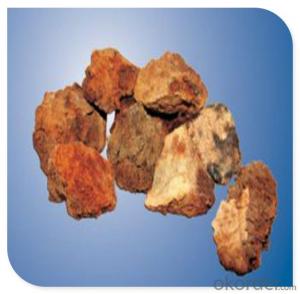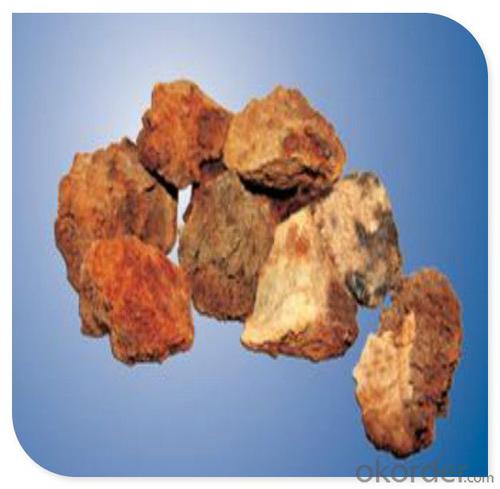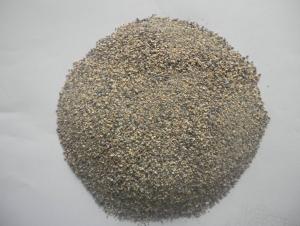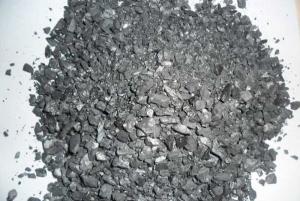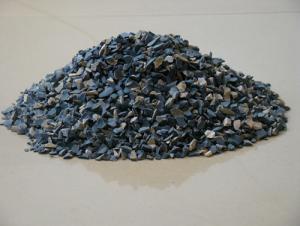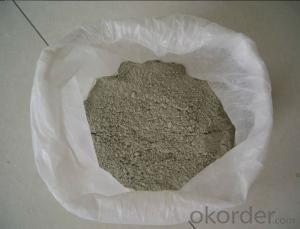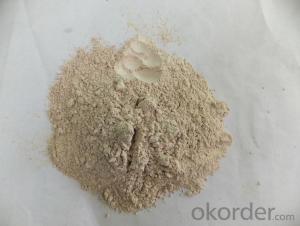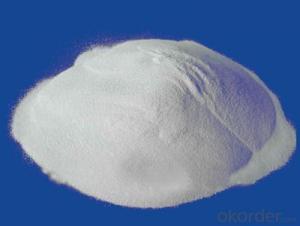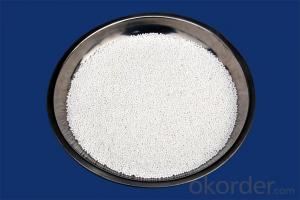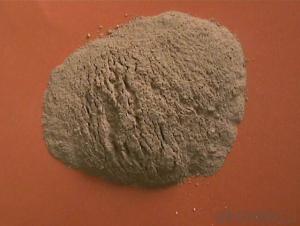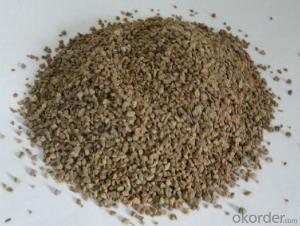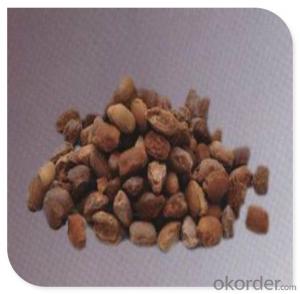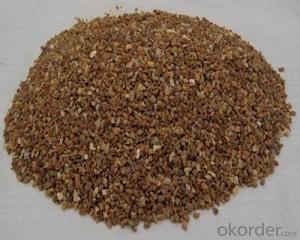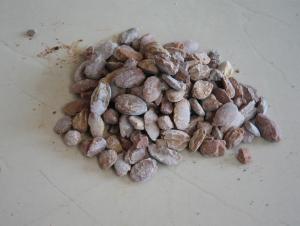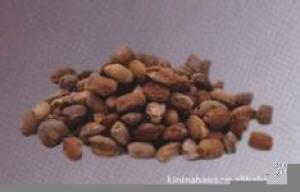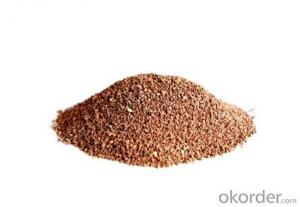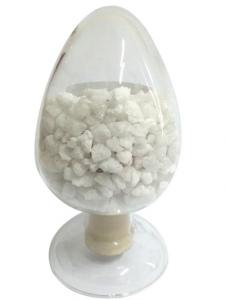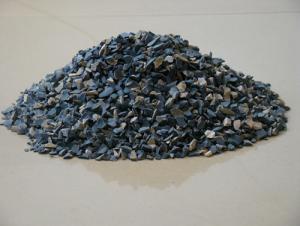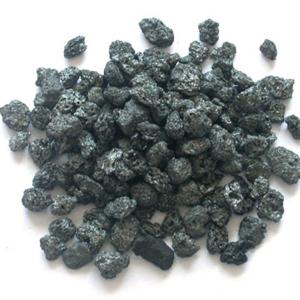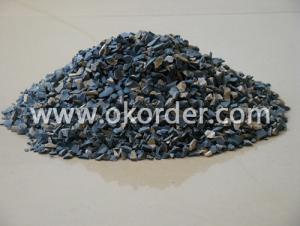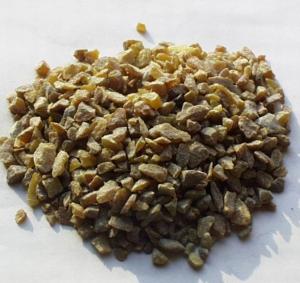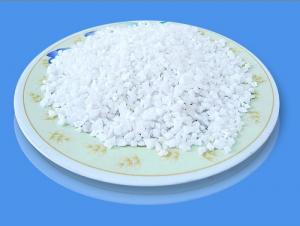Raw Materials for Refractory - Dead-Burned Magnesite (Dead Burnt Magnesite)
- Loading Port:
- Tianjin
- Payment Terms:
- TT OR LC
- Min Order Qty:
- 300 m.t
- Supply Capability:
- 50000 m.t/month
OKorder Service Pledge
OKorder Financial Service
You Might Also Like
Dead-burned Magnesiten Dead Burnt Magnesite
Specifications:
1.High purity Large crystal grain Compact structure
2.Strong resistance to slag material
3.Good thermal shock resistance
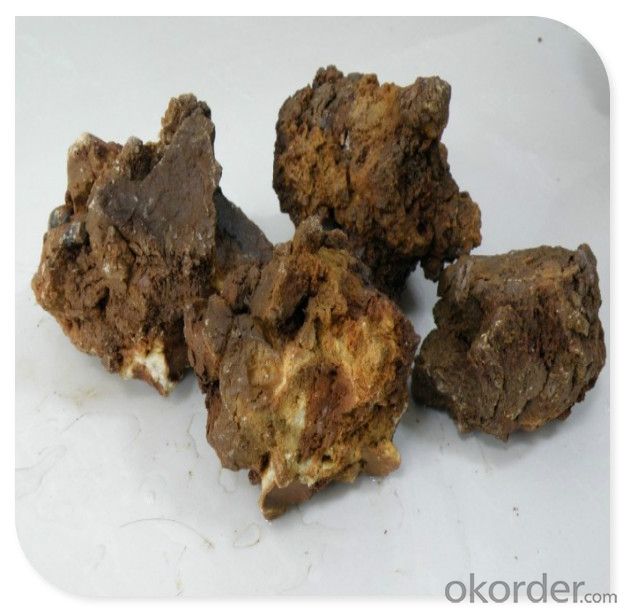
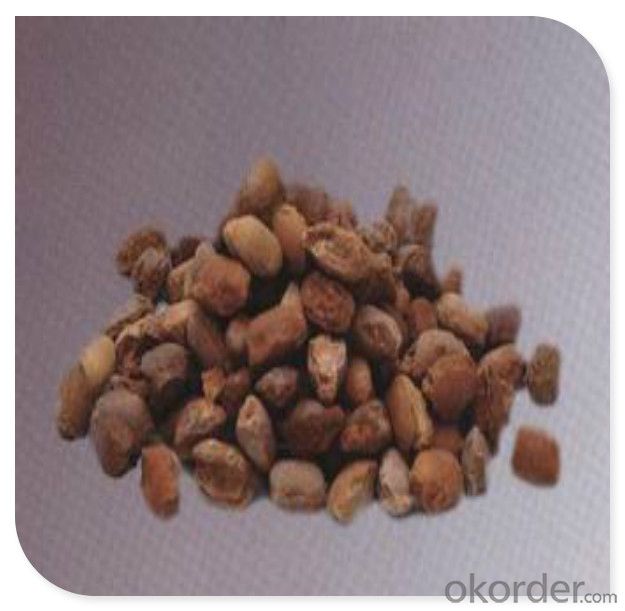
Magnesium Oxide is used in a number of industrial applications including: | |
Abrasives | As a binder in grinding wheels |
Animal feed supplement | Source of magnesium ions for chickens, cattle and other animals |
Boiler (oil-fired) additives | Material that is easily removed; reduced corrosion of steel pipes holding steam as well as sulfur emissions into the environment |
Boiler feedwater treatment | Reduces iron, silica and solids |
Chemicals | Starting point for the production of other magnesium salts such as sulfate and nitrate |
Coatings | Pigment extender in paint and varnish |
Construction | Basic ingredient of oxychloride cements used for flooring, wallboard, fiber board, and tile |
Electrical | Semi-conductors; heating elements insulating filler between wire and outer sheath |
Fertilizers | Source of essential magnesium for plant nutrition |
Foundries | Catalyst and water acceptor in shell molding |
Glass manufacture | Ingredient for specialty, scientific and decorative glassware and fiberglass |
Insulation | Light, flexible mats for insulating pipes |
Lubricating oils | Additive to neutralize acids |
Pharmaceuticals | Special grades of magnesium hydroxide, oxide and carbonate are used in antacids, cosmetics, toothpaste, and ointments |
Plastics manufacture | Filler, acid acceptor, thickener catalyst and pigment extender |
Refractory and ceramics | Basic ingredient in product formulations for the stee industry |
Rubber compounding | Filler, acid acceptor, anti-scorch ingredient, curing aid, pigment |
Steel industry | Annealing process; coating for grain-oriented silicon steel used in electrical transformers |
Sugar refining | Reduces scale build-up when used in juice clarification and precipitation |
Sulfite wood pulping | Source of base for cooking liquors |
Uranium, gallium & boron | Precipitation initiator by acid neutralization processing |
Wastewater treatment | Acid stream neutralizer; precipitates heavy metals |
Our Lab
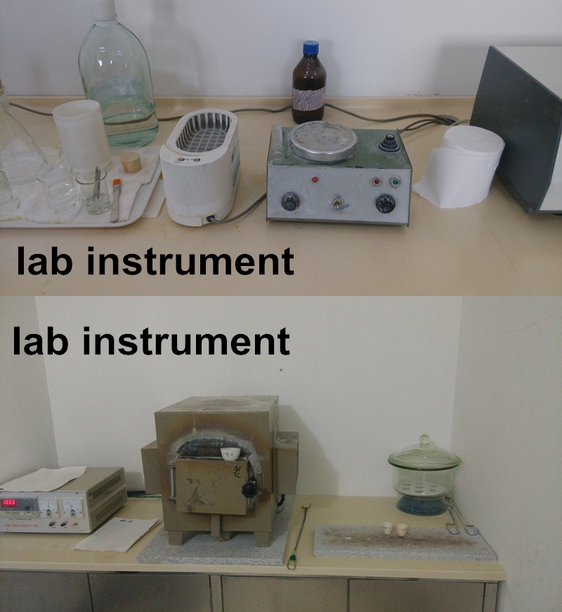
Our Service:
Large production capacity(20000-tons per month) ensure the fast production cycle after confirmed the order.
Produce the products according to clients' requirements.
Professional Packing,Avoid damage;Competitive Price,Make the products competitive in your market.
Provide 24 hours'consultation service.We are ready to answer our consultations at any time.
- Q: what kind of refractories is used to make the industrial silicon furnace mouth long life?
- Fused zirconia corundum brick, the smelter of the glassworks is used this kind of lining, and you can contact by private letter.
- Q: I wanna ask about the building insulation materials fire rating?
- Hello, I am happy to answer your questions about the classification of building insulation materials fire rating: 1. The thermal insulation material of level A combustion performance: Rock wool, glass wool, foam glass, foamed ceramics, foam cement, hole-closed perlite, etc. 2. combustion performance is level B1 insulation materials: Extruded polystyrene board (XPS) after special treatment / Special treatment of polyurethane (PU), phenolic aldehyde and gelatine powder polyphenyl granule 3 combustion performance is level B2 insulation material: Molding polystyrene board (EPS), extruded polystyrene board (XPS), polyurethane (PU), polyethylene (PE), etc. I hope I can help you
- Q: What the fireproofing materialare of the refractory kettle and where they can be sold?
- Many places sell these. Nearly 10 years, can't brun when it is dry, adsorption. You can also baidu these materials. Heat transfer evenly, feldspar, clay and other raw materials with a ceramic products. Traditional casserole can not resist heat difference and also can withstand for 100 high temperature without crack. Aiming at the problem of traditional casserole, easy to crack and air permeability, people joined the spodumene on raw material, produce a high-temperature resistance casserole. It is produced after the high temperature burning makes an earthenware pot to keep the original advantages. Hebei has many places to sell these materials and is also relatively cheaper. The traditional casserole has features of not easy to transfer heat's quartz and slow cooling. Due to production technology and raw materials, it greatly improves the casserole' practicability after research and improvement.
- Q: How to classify the grade of wall fireproof and thermal inuslation matertial?
- External wall thermal insulation materials are mainly divided into grade A, grade B1, grade B2 and grade B3. In accordance with the current "Combustion Performance Classification Method of Building Materials", grade A thermal insulation material is incombustible?material and belongs to inorganic heat preservation material. However, grade A thermal insulation material is few in terms of the current market. There are only JETCO YT inorganic active wall thermal insulation material, glass wool, rock wool board, foam glass, vitrified micro bead and grade A fireproofing thermal insulation board. However, compared with grade A thermal insulation material, the more welcomed by the market is the organic insulation materials. Thermal insulation material that is determined as grade B is divided into three levels. Grade B1 is grade is flame retardant. Grade B2 is combustible. Grade B3 is flammable.
- Q: What are grade classifications of the external walls for fireproofing?
- 1. The thermal insulation material of level A combustion performance: Rock wool, glass wool, foam glass, foamed ceramics, foam cement, hole-closed perlite, etc. 2. combustion performance is level B1 insulation materials: Extruded polystyrene board (XPS) after special treatment / Special treatment of polyurethane (PU), phenolic aldehyde and gelatine powder polyphenyl granule 3, combustion performance is level B2 insulation material: Molding polystyrene board (EPS), extruded polystyrene board (XPS), polyurethane (PU), polyethylene (PE), etc. See the 2009 edition construction technical measures 4.3.6 Level A insulation material is only for fireproofing, but its thermal insulation performance is not better than organic XPS \\ EPS and other materials. I feel the best insulation materials should be modified phenolic board, which can keep insulation and fireproofing, but the comprehensive unit price is very expensive.
- Q: How to measure the influence of high-temperature performance of the products refractory in the formation of the liquid phase.
- Seeing whether it can affect the usage of the refractory material, and seeing to reduce the impurity, what's the condition of temperature of the liquid phase. Practically, whether it has any difference if you can improve, load under load and creep and reduce the impurity content. In the refractories, producing liquid are the influence of impurities, high temperature resistant strength, compared the use of the refractory material temperature: testing compressive strength after burn. If there are any impact: knowing the main crystal phase of matrix composition and content, improving the content of the main crystalline phase can improve the high temperature performance of refractory materials.
- Q: What parts of cement kilns are refractories used on?
- These parts are decomposition furnace, smoke chamber, kiln, kiln hood, grate?cooler, tertiary air duct and coal pipe.
- Q: Does refractory belong to metallurgical auxiliary materials?
- Refractory includes metallurgical auxiliary materials.
- Q: What can red stone refractory do?
- Classification is divided into ordinary and special refractories two major categories. Ordinary refractories are divided into acidic, refractory, neutral and alkaline according to their chemical characteristics. According to the special refractory material consists of high temperature oxide, refractory compounds and high-temperature composite materials in addition, in accordance with the fire intensity can be divided into ordinary refractory products (1580 to 1770 DEG C), advanced refractory products (1770 to 2000 DEG C) and special refractory products (more than 2000 DEG C). According to the product shape can be divided into block (standard brick, special-shaped brick), special shape (crucible, sagger, pipes, etc.) (fibrous silicate aluminum, zirconium oxide and boron carbide material) and indefinite shape (refractory clay, pouring material and ramming material etc.). According to the sintering process, the products are divided into sintered products, casting products and fused blowing products. The main varieties of in general and special refractory materials, common varieties are mainly the following: acid refractories have a larger amount of silica brick and clay. Brick is siliceous products containing more than 93% SiO2, the use of raw materials with silica, silica and other waste. The silica acid slag erosion ability is strong, but vulnerable to the erosion of basic slag, its softening temperature is very high, close to the fire, the volume does not shrink after repeated burning, or even a slight swelling, but poor thermal shock resistance. The brick is mainly used for thermal equipment of glass furnace, coke oven, acid furnace etc.. Containing 30% ~ 46% alumina clay brick, with refractory clay as the main raw material, refractory 1580 degrees to 1770 degrees, good thermal shock resistance, which belongs to the weak acid refractory material, resistance to acid slag, widely used, is the largest production of a kind of refractory material.
- Q: Does the aluminum silicate thermal insulation material fireproof?
- With stable performance,long fiber length, strong tensile strength, strong seismic performance, low shot, light unit weight, low thermal conductivity, good insulation properties. it is not bad.
Send your message to us
Raw Materials for Refractory - Dead-Burned Magnesite (Dead Burnt Magnesite)
- Loading Port:
- Tianjin
- Payment Terms:
- TT OR LC
- Min Order Qty:
- 300 m.t
- Supply Capability:
- 50000 m.t/month
OKorder Service Pledge
OKorder Financial Service
Similar products
Hot products
Hot Searches
Related keywords
